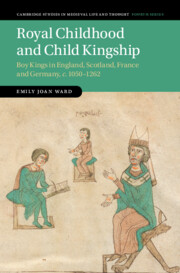‘Ward has undoubtedly already achieved an enormous amount with her book: she has worked out her subject in a stringent manner, examined a wealth of material and prepared it in an original way, compiled numerous observations worth considering and created various starting points for a critical examination of the subject. In this respect, her contribution to research can undoubtedly be described as successful.’
Clara Harder
Source: Sehepunkte (from German)
‘… a convincing reinterpretation of royal childhood and the kingship of rulers in childhood and a variety of suggestions for further research into the topic…’
Andreas Büttner
Source: H-Soz-Kult
‘Ward’s greatest contribution is to help broaden our understanding of medieval rulership. Her main conclusion, that children were valued members of and active participants within ruling families, provides a crucial contribution to ongoing research into medieval royal rulership. … Ward’s study will no doubt help to shape and further our understanding of what medieval rulership entailed.’
Abigail S. Armstrong
Source: Journal of the History of Childhood and Youth
‘This study, which also features a large number of valuable individual observations and new assessments of prominent cases of underage kings such as the Salian Henry IV, is convincing due to its consistent comparative analysis of a Europe-wide phenomenon.’
Benjamin Müsegades
Source: Deutsches Archiv für Erforschung des Mittelalters
‘This excellent book leaves the reader not only knowing more, but wanting more, information about royal children in medieval Europe.’
Lahney Preston-Matto
Source: Speculum
‘The issues raised by Emily Joan Ward’s book are immensely engaging and important. Her call to rethink what we suppose about child kingship in particular is original and most welcome. And her scholarly capacity for and interest in comparative European history makes her book a guide for archival and historiographical research oriented toward a truly European Middle Ages. May the lens continue to widen on our understanding of child kings, and may Ward continue to lead us as we explore this fascinating subject.’
Joseph P. Huffman
Source: The American Historical Review
‘The scope of this book is ambitious. While the main differences identified by Ward are those which develop over time, not among different polities, this does not mean that each of the four contexts examined was identikit, and Scotland emerges as distinctive in a number of ways, including, beyond those already mentioned, a lack of co-kingship and distinctive inauguration practices (p. 138). Across these contexts, however, Ward shows that the liminality of child rulersrenders them not simply anomalies, but an important lens through which our understandings of kings of all kinds - big as well as small - can be recalibrated.’
Amy Blakeway
Source: The Scottish Historical Review
‘A highly impressive feat of scholarship … No longer will child kings be able to be kept “out of sight, out of mind”. Ward, like the contemporary societies that had to deal with them, has made her boy kings visible and important in our understanding of what kingship was in the Middle Ages.’
Andrew M. Spencer
Source: The Scottish Historical Review



